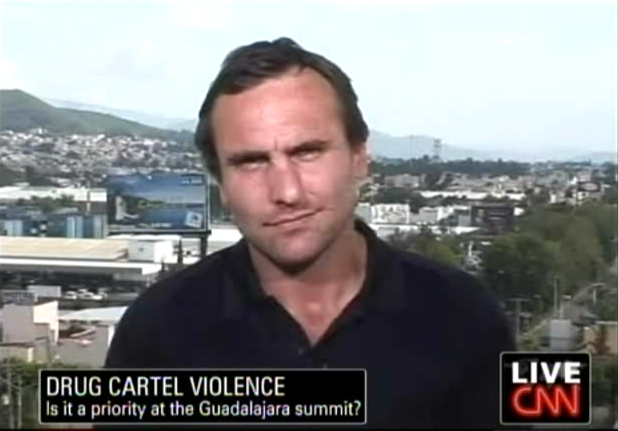NR: "America really is not yet fighting this war."
August 09, 2009

Length: 4:26
LARGE (51.4 MB) ----- SMALL (5.4 MB)
Michael is now on a rooftop in Guadalajara and (after another showing of Wednesday's Los Zetas piece) talks to Don Lemon about the big picture of the drug war -- the supply/distribution route and the tough choices ahead for Americans.
DON LEMON, CNN NEWS ANCHOR: All right. CNN's Michael Ware is in Guadalajara, Mexico. He is standing by. We're going to talk to Michael in just a little bit about what's happening there. And what should the leaders be talking about when it comes to Los Zetas and the drug cartels. Meantime, here's some of your feedback, Michael's going to join us on the other side of the break.
LEMON: All right. Before we went to the break, we saw a report from CNN's Michael Ware about the Zetas, Mexico's most dangerous drug cartel.
CNN's Michael Ware joins us now from Guadalajara, Mexico.
Michael, thank you very much. The drug violence seems like, you know, extremely urgent issue when it comes to the U.S., to Canada, and to Mexico, obviously. We're not hearing that much about it. It doesn't seem like it's that high on the agenda. What can the U.S. expect to get out of this, if anything, out of this summit?
WARE: Well, Don, President Obama has, we're told, landed now in Mexico, so he should be here in the city of Guadalajara. And we do know that the drug war is on the agenda.
Now, what everyone will be looking out of any discussions about the drug war from President Obama is two things -- money and guns. America is partnering with the Mexican government in the war against the drug cartels. The Mexican government is risking everything. Mexican President Felipe Calderon has sent more than 40,000 army troops into the streets of his own city.
But one could understand if he feels like he's doing that alone. America has promised $1.4 billion over three years, but that's $400 or $500 million a year.
Now, El Chapo Guzman, the head of just one cartel of many, one individual, his net worth is estimated at more than double what America is putting into the drug fight every year. America really is not yet fighting this war. And I think the Mexican government will be hoping that Obama will have something to bring to the table and something to announce, some real involvement in terms of money. I mean, Mexico's still waiting on delivery of helicopters that they've been begging for.
Also guns, the guns that are being used to fight this war are coming from America. This doesn't just mean stopping at the border and increased border control. It means preventing the sales in the first place. Mexico's calling for a weapons assault ban. Let's see if the Obama administration can actually step up on any of these fronts and actually begin to fight the drug war in Mexico, Don.
LEMON: You know what, Michael, a lot of people are asking this. In your report you said it was upwards of $40 to $50 billion a year that the drug cartels -- at least one of them, that they can make, that they can generate. So the question then becomes, why not regulation and taxation, especially now with a sinking economy, if you have that much revenue coming in.
WARE: Well, that's the thing, Don. If you look at the grand scheme of this drug war, I mean, it's not about the American border. It starts in the Andies in South America and goes to the streets of the United States and to the streets of Canada. In the Andes, you have production. In Central America, you have warehousing and transshipment of the drugs. In Panama, you have the money laundering and the banking. And Mexico is the retail end. By the time you get into the United States, that distribution.
Now, the profit incentive is not going to go away until America's demand for this multibillion dollar supply of elicit drugs, every year perhaps up to $30 billion to $40 billion a year, goes away, until this demand disappears. Now, I don't know about you, Don, but I don't see that American demand disappearing any time soon.
So America's got some tough choices. It's got to get real about this war. You either send the 101st Airborne Division into Mexico and really seal that border, which isn't that possible, or you start thinking about regulating some of these drugs and taxing them and looking at earning some revenue. There's tough choices ahead for any American administration that really wants to tackle the war on drugs, Don.
LEMON: CNN's Michael Ware in Guadalajara, Mexico. Michael, we appreciate it.
